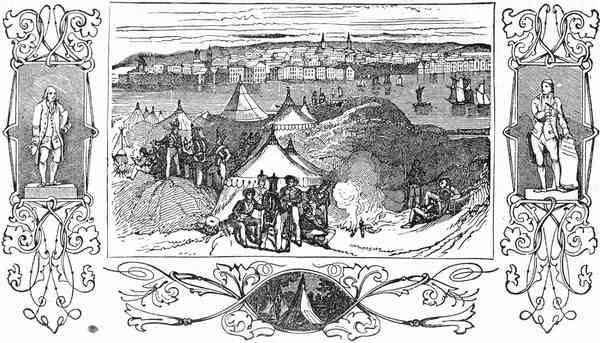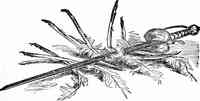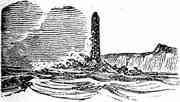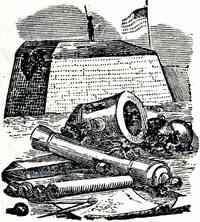Thrilling Incidents In American History
• Preface
Revolutionary War
• Opening Of The Revolution
• The Boston Massacre
• Affair of the Sloop Liberty
• Affair of the Gaspee
• The Tea Riot
• The Boston Port Bill
• The First Continental Congress-Consequent Parliamentary proceedings
• Organization of the Minute-Men
• Patrick Henry-Second Provincial Congress-First Military Enterprise
• Battles of Lexington and Concord
• Battle of Bunker's Hill
• Capture of Ticonderoga
• Second Continental Congress-Washington's Appointment
• Siege of Boston
• Incidents at the Evacuation of Boston
• Burning of Falmouth
• Arnold's Expedition to Quebec
• Siege of Quebec, and Death of Montgomery
• Scenes at Quebec during the Siege
• Expedition against Charleston
• The Declaration of Independence
• The Battle of Long Island
• Washington's Retreat through New Jersey-Capture of General Lee
• Battle of Trenton
• Battle of Princeton
• Capture of General Prescott
• Battle of Brandywine
• Battle of Germantown
• Battle of Red-Bank
• Attack on Fort Mifflin-Retirement of the Army to Valley Forge
• Battle of Bennington
• Murder of Miss M'Crea
• Battle of Stillwater
• Battle of Bemis' Heights, and Retreat of Burgoyne
• Capture of Forts Clinton and Montgomery
• Surrender of Burgoyne
• The Treaty with France
• Attack on Savannah, and Death of Pulaski
• Storming of Stony Point
• General Sullivan's Campaign against the Mohawks
• Tarleton's Quarters
• Battle of Camden, and Death of De Kalb
• Arnold's Treason
• The Loss of the Randolph
• The British Prison-Ships
• Capture of the Serapis
• Putnam's Feat at Horseneck
• Battle of Eutaw Springs
• Wayne's Charge at Green Spring
• Capture of the General Monk
• The Mutinies
• Battle of the Cowpens
• Capture of New London
• Massacre of Wyoming
• Surrender of Cornwallis
War With France
• Capture of L'Insurgente
• The Constellation and Vengeance
War With Tripoli
• Burning of the Philadelphia
• Bombardment of Tripoli
• Loss of the Intrepid
• Expedition of General Eaton
Second War With England
• Battle of Tippecanoe
• Capture of the Guerriere
• Tragical Affair of an Indian Chief
• Battle and Massacre at the River Raisin
• Captain Holmes's Expedition
• Capture of the Caledonia and Detroit
• The Wasp and Frolic
• Gallant Conduct of Lieutenant Allen at the Capture of the Macedonian
• Capture and Destruction of the Java
• Siege of Fort Meigs
• Capture of York, and Death of General Pike
• Defence of Sackett's Harbour
• Defence of Fort Stephenson
• Battle of Lake Erie
• Battle of the Thames
• Gallant Action of Commodore Chauncey under the guns of Kingston Citadel
• The Sacking of Hampton
• Capture of the Peacock
• Massacre at Fort Mimms
• Surrender of Weatherford
• Battle of Niagara
• BattIe of New Orleans
War With Mexico
• Battle of Palo Alto
• Battle of Resaca de la Palma
• Capture of Monterey
• Battle in the Streets of Monterey
• Thrilling Scenes in the Battle of Buena Vista
• Bombardment of Vera Cruz
• Battle of Cerro Gordo
• Battles of Contreras and Churubusco
• Storming of Chapultepec


Siege of Boston

SIEGE OF BOSTON.
 THE colonists had thus experienced an almost uninterrupted career of success,
and, with the exception of Boston, England had not a spot left in the wbole
range of their territory. Yet reflecting men
easily saw, that they had prevailed only against an advanced guard and
scattered, detachments, and that the struggle had not yet commenced with the
main force of the British empire. Washington, meantime, on proceeding to the
army, was received in the most cordial manner, and without the smallest symptom
of jealousy; the provincial congress sending a
committee to meet him at Springfield on the
frontier, and escort him to Boston. He there found fourteen thousand five
hundred men, able-bodied,
zealous in the cause, and personally courageous, but destitute of almost every
element of military organization. A great proportion wanted bayonets, and the
alarming discovery was soon made that they hod not above nine rounds of
gunpowder. There were no tents, and clothes extremely deficient; there was
neither commissary nor quartermaster-general. No combination existed between
the troops drawn from different colonies; and the officers, mostly chosen by
the men, could exercise scarcely any authority. These evils were the more
difficult to remedy, as the army, enlisted only for a short period, would
disband in a few months, and be replaced by one composed of raw recruits. In
these circumstances, Washington anxiously desired to make an attack upon
Boston, and dislodge the troops before the large expected reinforcements should
arrive, when the prospects could not but become gloomy. Yet a council of
officers decided, seemingly on good grounds, that such an attempt could have no
chance of success; and he was obliged, very reluctantly, to await the turn which
events might take.
THE colonists had thus experienced an almost uninterrupted career of success,
and, with the exception of Boston, England had not a spot left in the wbole
range of their territory. Yet reflecting men
easily saw, that they had prevailed only against an advanced guard and
scattered, detachments, and that the struggle had not yet commenced with the
main force of the British empire. Washington, meantime, on proceeding to the
army, was received in the most cordial manner, and without the smallest symptom
of jealousy; the provincial congress sending a
committee to meet him at Springfield on the
frontier, and escort him to Boston. He there found fourteen thousand five
hundred men, able-bodied,
zealous in the cause, and personally courageous, but destitute of almost every
element of military organization. A great proportion wanted bayonets, and the
alarming discovery was soon made that they hod not above nine rounds of
gunpowder. There were no tents, and clothes extremely deficient; there was
neither commissary nor quartermaster-general. No combination existed between
the troops drawn from different colonies; and the officers, mostly chosen by
the men, could exercise scarcely any authority. These evils were the more
difficult to remedy, as the army, enlisted only for a short period, would
disband in a few months, and be replaced by one composed of raw recruits. In
these circumstances, Washington anxiously desired to make an attack upon
Boston, and dislodge the troops before the large expected reinforcements should
arrive, when the prospects could not but become gloomy. Yet a council of
officers decided, seemingly on good grounds, that such an attempt could have no
chance of success; and he was obliged, very reluctantly, to await the turn which
events might take.
In the meantime, Washington laboured under accumulated difficulties in prosecuting the blockade of Boston. The scarcity of ammunition, notwithstanding every effort of Congress, continued almost unabated; while the want of money, as well as of necessary equipments, was deeply felt on the advance of the rigorous season. With all his energy and firmness, he seems to have been exceedingly sensitive to troubles and opposition. He describes his situation as inexpressibly distressing,-the winter approaching on an army at once naked and without a dollar; and declares that unless some remedy were devised, the force must be broken up. Amid all these distresses, it was necessary to keep up a good face towards the enemy, while many on his own side, exaggerating both the numbers and efficiency of his troops, wondered he should remain inactive, and not have already driven the English out of Boston. These criticisms touched him sensibly; yet, as a true patriot, he carefully concealed the explanation, which, reaching the opposite party, would have produced fatal effects. Even Congress, with a jealousy of military power, in his case very unjust, were indisposed to measures most requisite for the success of his army. As none of any importance could be taken without their concurrence, as well as that of the provincial assemblies, they were always delayed, and often obstructed.
An imminent danger now impended; December approached, when the troops, having been enlisted for only one year, were all entitled to return home. To this subject the commander earnestly solicited the attention of Congress, and on the 18th of October a committee of their number, Franklin, Lynch, and Harrison, arrived at his head-quarters. Being persons of judgment, they arranged matters very satisfactorily. Authority was given to levy twenty-six regiments, estimated at somewhat above twenty thousand men, independently of militia. Congress would not consent, however, to the enlistment for more than a year, nor would they, till the next January, agree to grant a bounty. Washington made the strongest appeals to the men, entreating them by every motive of honour and patriotism to adhere to those standards under which they had gloriously fought. But that ardent impulse whicll had called them to arms was now sensibly cooled; and when the time arrived, not above five thousand had engaged. These were afterwards reinforced; but this dissolution of one army and assemblage of another, in the face of an enemy whose force was constantly increasing; placed the commander in a very critical situation.
He was also harassed from another quarter. The English in Boston, being straitened for provisions, sought to procure them by descents on different parts of the coast, treating the inhabitants, who were uniformly hostile, with very little ceremony. Falmouth suffered such a severe cannonade and oombardment as to reduce it to ashes, and it was reported or dreaded that a similar fate impended over the other seaports. Urgent applications were made to the commander-in-chief for aid; but he represented that his army was barely adequate to blockade Boston, and could not be broken down into detachments for local objects, which ought to be provided for by the militia of the districts. His views were sanctioned by Congress. He endeavoured, however, to protect the shore by forming a small marine, placing troops on board the vessels; and in a few weeks six schooners were fitted out. They were fortunate enough soon to capture a ship laden with military stores, most valuable for the supply of the army. In other respects this force was for some time inefficient, and its discipline very imperfect; but it was gradually improved; prize courts and regulations were formed, and its privateering operatIons proved ultimately very harassing to the British;
Meantime, General Gage remained inactive at Boston; a course generally condemned by historians as at once unaccountable and shameful. Yet, besides being by no means fully aware of Washington's weakness, he assigned other reasons which appear conclusive. Though he might have dislodged the Americans from their position, little would have been gained by marching into the interior of New England, a territory full of people animated with peculiar zeal in the cause of independence, and which, though containing many small towns, offered no central or leading point of attack. He must merely have moved from place to place, continually harassed by that desultory warfare in which they had shown themselves to excel. In the beginning of October he was recalled, without any expression of displeasure, yet probably under the impression of the disasters which the cause had sustained in his hands, and the hope that it might be more fortunate in those of another. The command then devolved upon Howe, who concurred with his predecessor as to the inexpediency of advancing into the interior of New England. He submitted to the cabinet another plan, by which Boston should be held only till the close of the winter, and the troops there, with all those expected from the mother country, be then concentrated at New York, and the main attack made from that quarter. The inhabitants were more loyal, and by striking at the heart of the Union he would separate the northern and southern states, and then, according to circumstances, carry on operations against either.
Washington, meantime, was very slowly recruiting his army, which, at the beginning of February; did not reach quite nine thousand men. Being at that period permitted to offer a bounty, he had in a month collected above fourteen thousand, reinforced by sit thousand Massachusetts militia. He considered this force sufficient to attack the city; but a council of officers decided, probably with reason, that such an attempt offered no chance of success. They proposed rather to seize and fortify the peninsular point named Dorchester Neck, whence the harbour would be in a great degree commanded, and the place, it was hoped, rendered untenable. To this he consented, though with great chagrin; and the execution of the movement was intrusted to General Ward. The British were amused two days by an incessant cannonade and bombardment,-till at nightfall of the 4th of March, General Thomas, with a working body of twelve hundred, a covering force of eight hundred, and three hundred carts of materials, marched undiscovered, and took possession of the most elevated part of the heights. The Americans, being chiefly practical farmers, were extremely skilful in intrenching, and laboured with such diligence, that in the morning the English with astonishment beheld them in a strongly fortified position. The admiral then gave notice to Howe, that the harbour could not be deemed secure as long as this post was held by the Americans. Lord Percy, with three thousand men, was employed to dislodge them; but a violent storm rendered the operation impossible, and before it dispersed the works were considered beyond the reach of assault. vVashington had prepared a select corps to attack the town, while its main force should be directed against the heights; but this project, never very feasible, was now of course given up. The British commander then prepared to evacuate the place.
On the 17th the enemy embarked in their ships, and after remaining a few days in Nantasket roads, sailed towards Halifax, General Putnam immediately entered Boston, which was found strongly fortified, and quite uninjured. Washington entertained great apprehension that the city would be destroyed, though the English seem never to have entertained any such idea; and some cannon and stores, which could not be carried away, became available to him.
